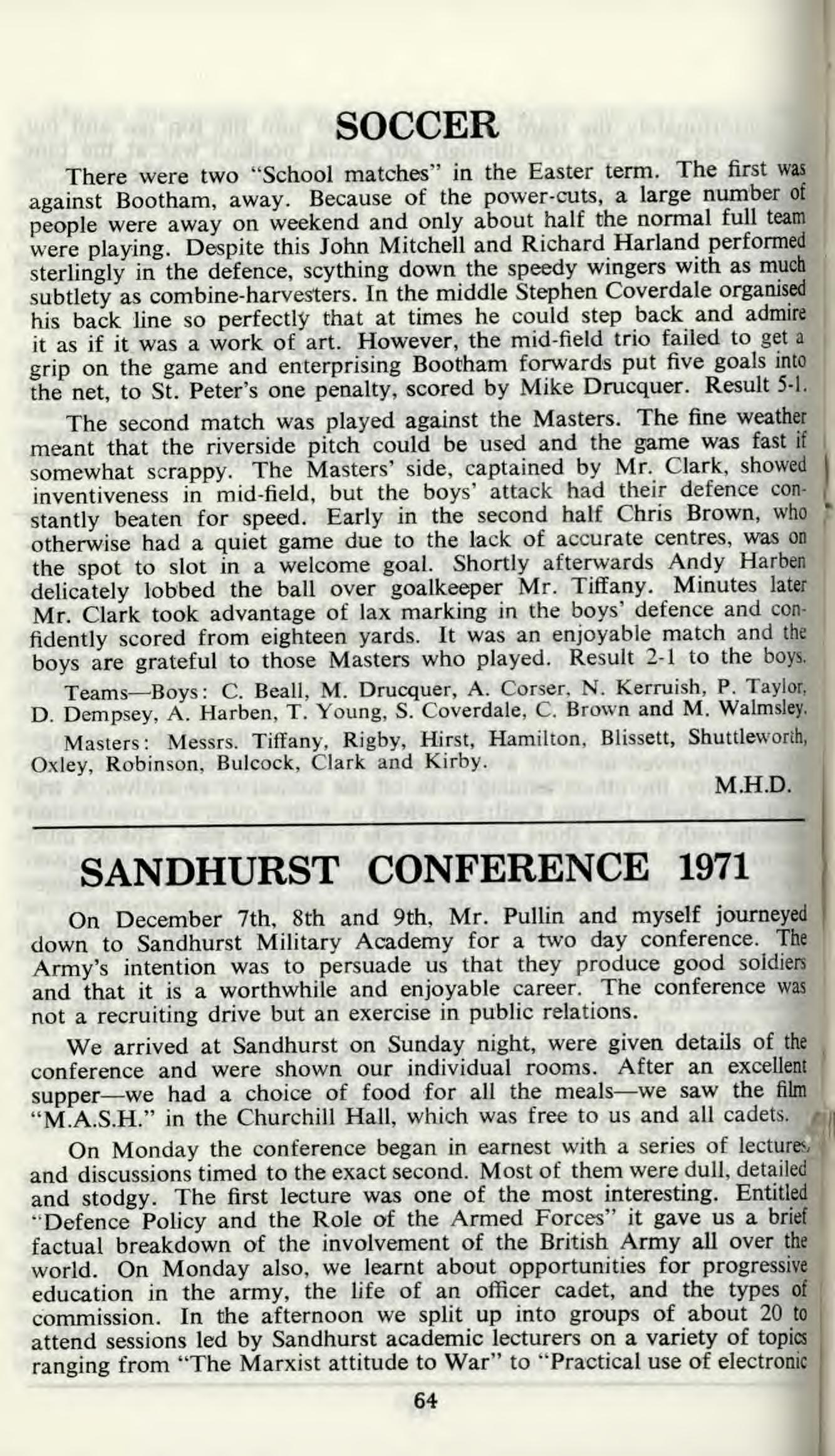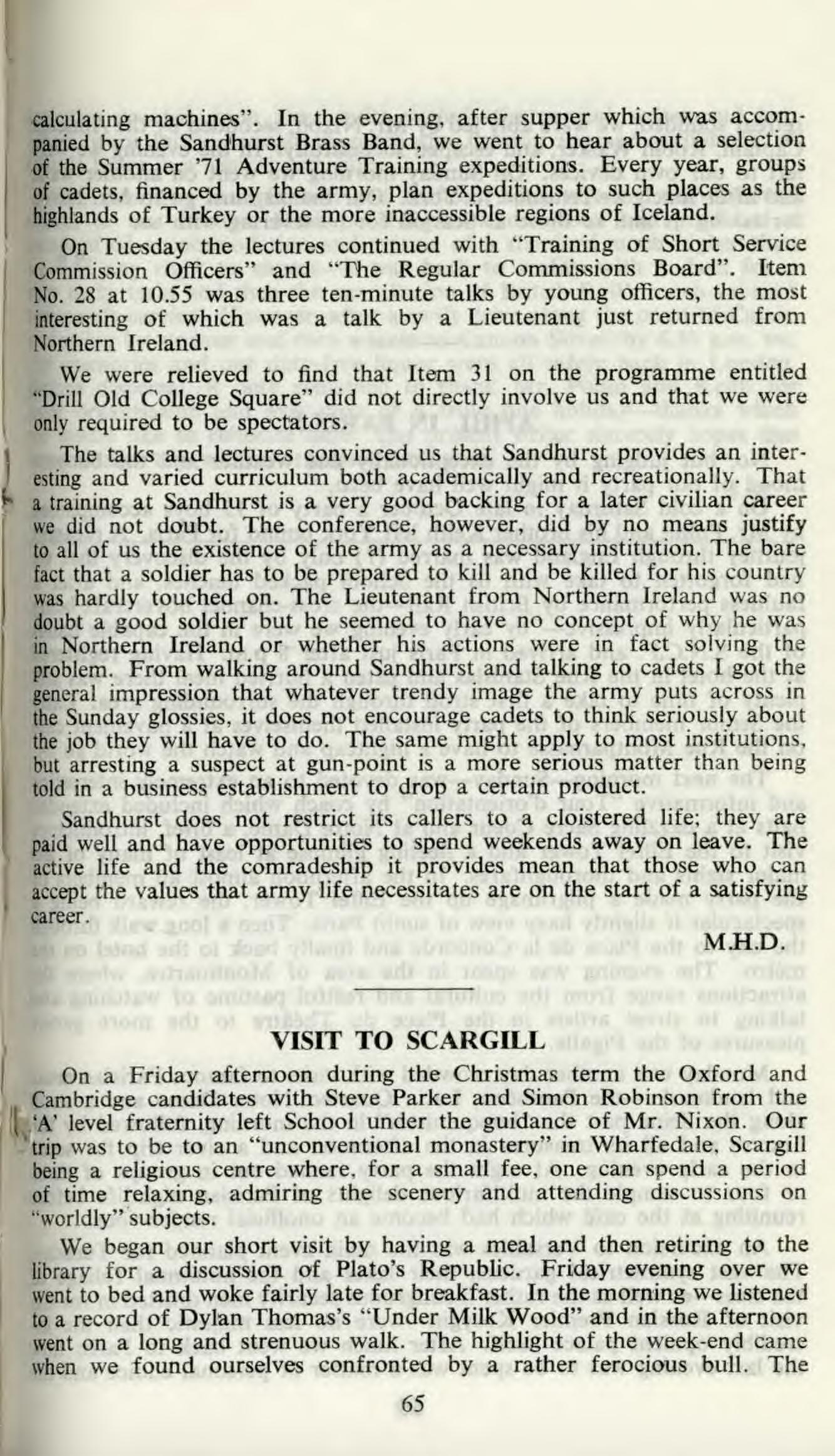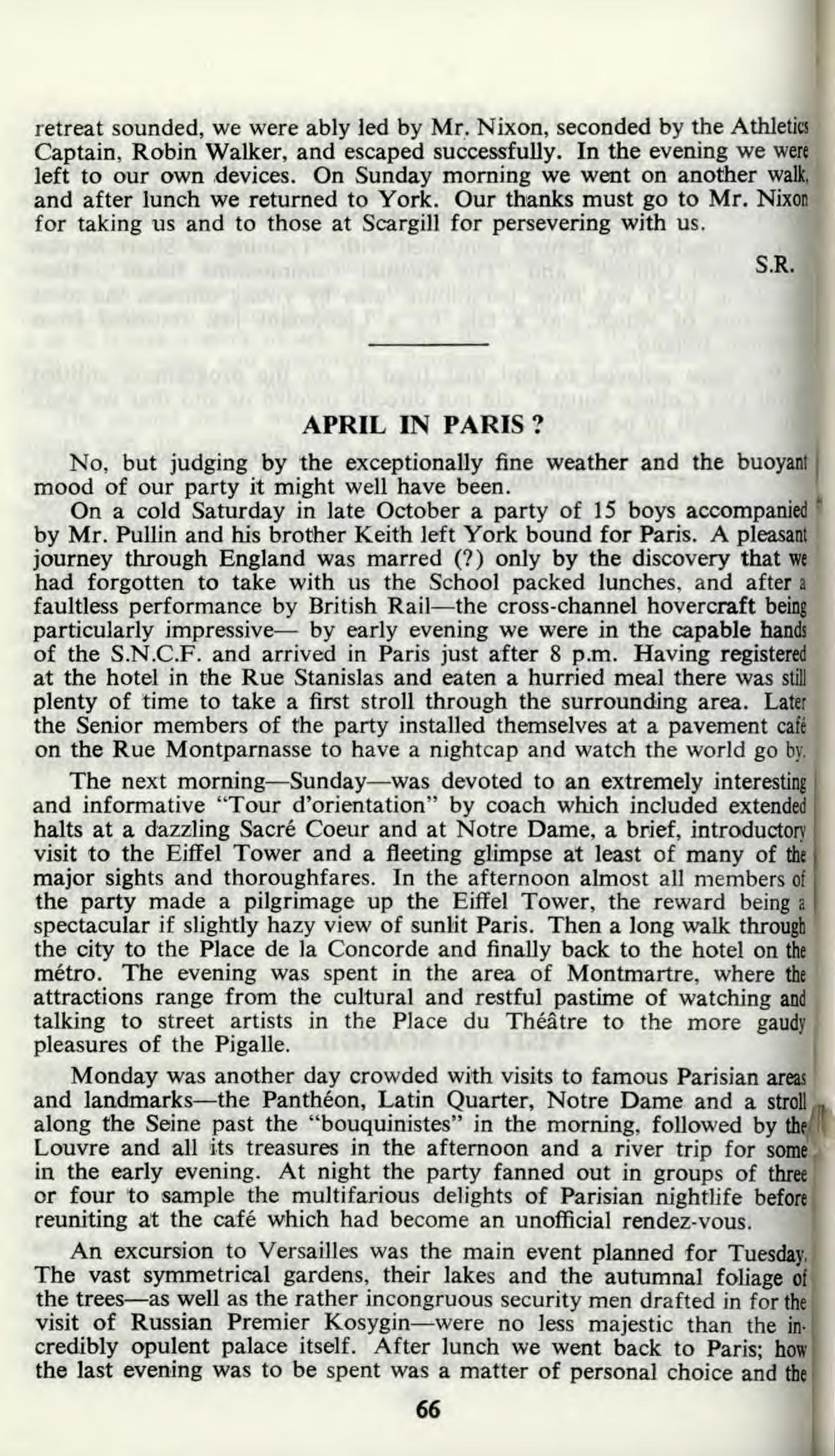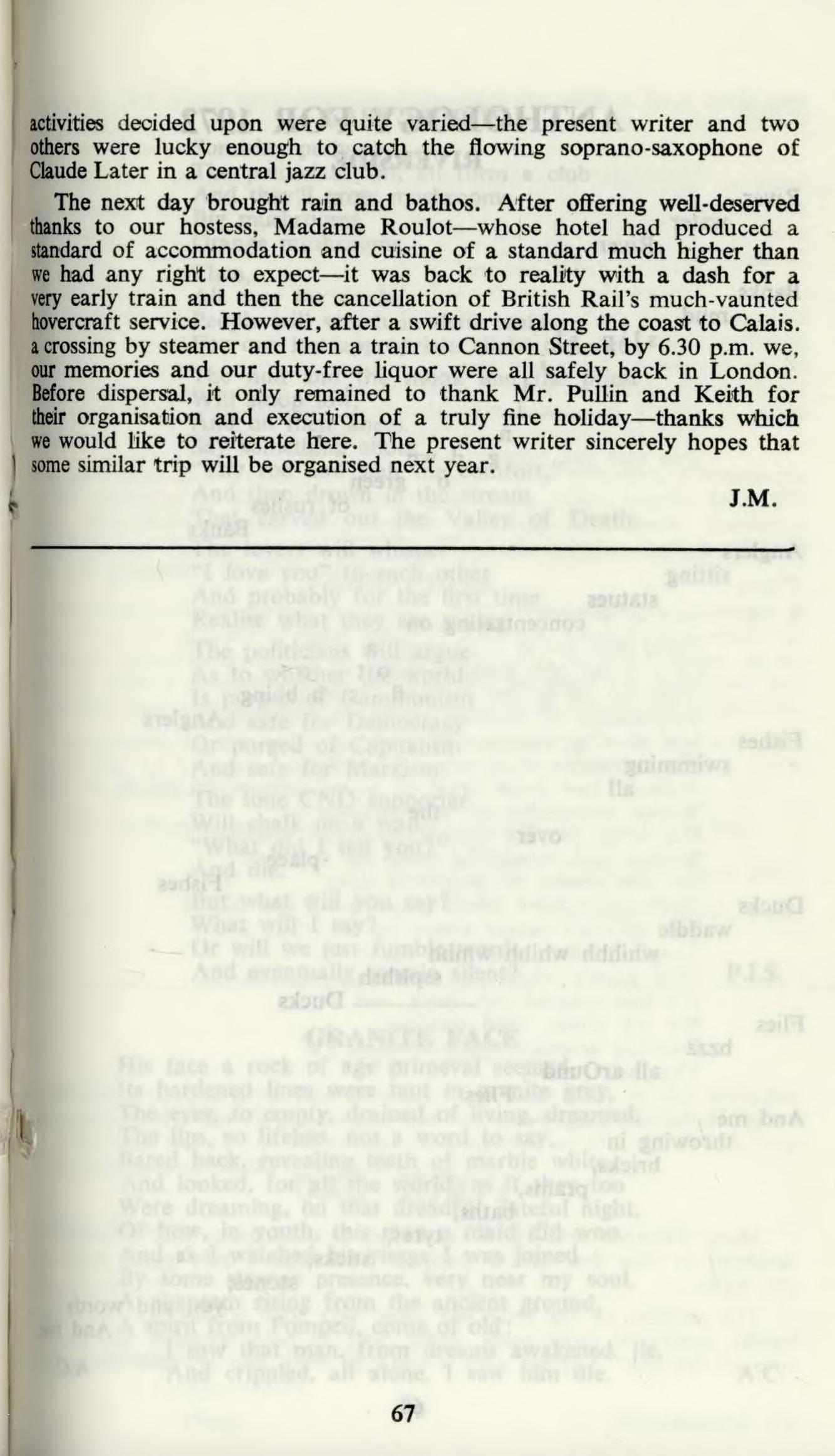
8 minute read
Sandhurst Conference 1971
from May 1972
by StPetersYork
SOCCER
There were two "School matches" in the Easter term. The first was against Bootham, away. Because of the power-cuts, a large number of people were away on weekend and only about half the normal full team were playing. Despite this John Mitchell and Richard Harland performed sterlingly in the defence, scything down the speedy wingers with as much subtlety as combine-harvesters. In the middle Stephen Coverdale organised his back line so perfectly that at times he could step back and admire it as if it was a work of art. However, the mid-field trio failed to get a grip on the game and enterprising Bootham forwards put five goals into the net, to St. Peter's one penalty, scored by Mike Drucquer. Result 5-1.
The second match was played against the Masters. The fine weather meant that the riverside pitch could be used and the game was fast if somewhat scrappy. The Masters' side, captained by Mr. Clark, showed inventiveness in mid-field, but the boys' attack had their defence constantly beaten for speed. Early in the second half Chris Brown, who otherwise had a quiet game due to the lack of accurate centres, was on the spot to slot in a welcome goal. Shortly afterwards Andy Harben delicately lobbed the ball over goalkeeper Mr. Tiffany. Minutes later Mr. Clark took advantage of lax marking in the boys' defence and confidently scored from eighteen yards. It was an enjoyable match and the boys are grateful to those Masters who played. Result 2-1 to the boys.
Teams—Boys: C. Beall, M. Drucquer, A. Corser, N. Kerruish, P. Taylor, D. Dempsey, A. Harben, T. Young, S. Coverdale, C. Brown and M. Walmsley.
Masters: Messrs. Tiffany, Rigby, Hirst, Hamilton, Blissett, Shuttleworth, Oxley, Robinson, Bulcock, Clark and Kirby. M.H.D.
SANDHURST CONFERENCE 1971
On December 7th, 8th and 9th, Mr. Pullin and myself journeyed down to Sandhurst Military Academy for a two day conference. The Army's intention was to persuade us that they produce good soldiers and that it is a worthwhile and enjoyable career. The conference was not a recruiting drive but an exercise in public relations.
We arrived at Sandhurst on Sunday night, were given details of the conference and were shown our individual rooms. After an excellent ' supper—we had a choice of food for all the meals—we saw the film "M.A.S.H." in the Churchill Hall, which was free to us and all cadets. f q
On Monday the conference began in earnest with a series of lecture, and discussions timed to the exact second. Most of them were dull, detailed and stodgy. The first lecture was one of the most interesting. Entitled "Defence Policy and the Role of the Armed Forces" it gave us a brief factual breakdown of the involvement of the British Army all over the world. On Monday also, we learnt about opportunities for progressive education in the army, the life of an officer cadet, and the types of commission. In the afternoon we split up into groups of about 20 to attend sessions led by Sandhurst academic lecturers on a variety of topics ranging from "The Marxist attitude to War" to "Practical use of electronic 64 ii
calculating machines". In the evening, after supper which was accompanied by the Sandhurst Brass Band, we went to hear about a selection of the Summer '71 Adventure Training expeditions. Every year, groups of cadets, financed by the army, plan expeditions to such places as the highlands of Turkey or the more inaccessible regions of Iceland.
On Tuesday the lectures continued with "Training of Short Service Commission Officers" and "The Regular Commissions Board". Item No. 28 at 10.55 was three ten-minute talks by young officers, the most interesting of which was a talk by a Lieutenant just returned from Northern Ireland.
We were relieved to find that Item 31 on the programme entitled "Drill Old College Square" did not directly involve us and that we were only required to be spectators.
The talks and lectures convinced us that Sandhurst provides an interesting and varied curriculum both academically and recreationally. That a training at Sandhurst is a very good backing for a later civilian career we did not doubt. The conference, however, did by no means justify to all of us the existence of the army as a necessary institution. The bare fact that a soldier has to be prepared to kill and be killed for his country was hardly touched on. The Lieutenant from Northern Ireland was no doubt a good soldier but he seemed to have no concept of why he was in Northern Ireland or whether his actions were in fact solving the problem. From walking around Sandhurst and talking to cadets I got the general impression that whatever trendy image the army puts across in the Sunday glossies, it does not encourage cadets to think seriously about the job they will have to do. The same might apply to most institutions, but arresting a suspect at gun-point is a more serious matter than being told in a business establishment to drop a certain product.
Sandhurst does not restrict its callers to a cloistered life; they are paid well and have opportunities to spend weekends away on leave. The active life and the comradeship it provides mean that those who can accept the values that army life necessitates are on the start of a satisfying career.

M.H.D.
VISIT TO SCARGILL
On a Friday afternoon during the Christmas term the Oxford and , v
Cambridge candidates with Steve Parker and Simon Robinson from the 1 'A' level fraternity left School under the guidance of Mr. Nixon. Our trip was to be to an "unconventional monastery" in Wharfedale, Scargill being a religious centre where, for a small fee, one can spend a period of time relaxing, admiring the scenery and attending discussions on
"worldly" subjects.
We began our short visit by having a meal and then retiring to the library for a discussion of Plato's Republic. Friday evening over we went to bed and woke fairly late for breakfast. In the morning we listened to a record of Dylan Thomas's "Under Milk Wood" and in the afternoon went on a long and strenuous walk. The highlight of the week-end came when we found ourselves confronted by a rather ferocious bull. The 65
retreat sounded, we were ably led by Mr. Nixon, seconded by the Athletics Captain, Robin Walker, and escaped successfully. In the evening we were left to our own devices. On Sunday morning we went on another walk, and after lunch we returned to York. Our thanks must go to Mr. Nixon for taking us and to those at Scargill for persevering with us.
S.R.
APRIL IN PARIS ?
No, but judging by the exceptionally fine weather and the buoyant mood of our party it might well have been.
On a cold Saturday in late October a party of 15 boys accompanied by Mr. Pullin and his brother Keith left York bound for Paris. A pleasant journey through England was marred (?) only by the discovery that we had forgotten to take with us the School packed lunches, and after a faultless performance by British Rail—the cross-channel hovercraft being particularly impressive— by early evening we were in the capable hands of the S.N.C.F. and arrived in Paris just after 8 p.m. Having registered at the hotel in the Rue Stanislas and eaten a hurried meal there was still plenty of time to take a first stroll through the surrounding area. Later the Senior members of the party installed themselves at a pavement café on the Rue Montparnasse to have a nightcap and watch the world go by.
The next morning—Sunday—was devoted to an extremely interesting and informative "Tour d'orientation" by coach which included extended halts at a dazzling Sacre Coeur and at Notre Dame, a brief, introductory visit to the Eiffel Tower and a fleeting glimpse at least of many of the major sights and thoroughfares. In the afternoon almost all members of the party made a pilgrimage up the Eiffel Tower, the reward being a spectacular if slightly hazy view of sunlit Paris. Then a long walk through the city to the Place de la Concorde and finally back to the hotel on the metro. The evening was spent in the area of Montmartre, where the attractions range from the cultural and restful pastime of watching and talking to street artists in the Place du 'Theatre to the more gaudy pleasures of the Pigalle.
Monday was another day crowded with visits to famous Parisian areas and landmarks—the Pantheon, Latin Quarter, Notre Dame and a stroll along the Seine past the "bouquinistes" in the morning, followed by then Louvre and all its treasures in the afternoon and a river trip for some , in the early evening. At night the party fanned out in groups of three or four to sample the multifarious delights of Parisian nightlife before reuniting at the café which had become an unofficial rendez-vous.
An excursion to Versailles was the main event planned for Tuesday. The vast symmetrical gardens, their lakes and the autumnal foliage of the trees—as well as the rather incongruous security men drafted in for the visit of Russian Premier Kosygin—were no less majestic than the in. credibly opulent palace itself. After lunch we went back to Paris; how the last evening was to be spent was a matter of personal choice and the
66

activities decided upon were quite varied—the present writer and two others were lucky enough to catch the flowing soprano-saxophone of Claude Later in a central jazz club.
The next day brought rain and bathos. After offering well-deserved thanks to our hostess, Madame Roulot—whose hotel had produced a standard of accommodation and cuisine of a standard much higher than we had any right to expect—it was back to reality with a dash for a very early train and then the cancellation of British Rail's much-vaunted hovercraft service. However, after a swift drive along the coast to Calais. a crossing by steamer and then a train to Cannon Street, by 6.30 p.m. we, our memories and our duty-free liquor were all safely back in London. Before dispersal, it only remained to thank Mr Pullin and Keith for their organisation and execution of a truly fine holiday—thanks which we would like to reiterate here. The present writer sincerely hopes that some similar trip will be organised next year.
J.M.











